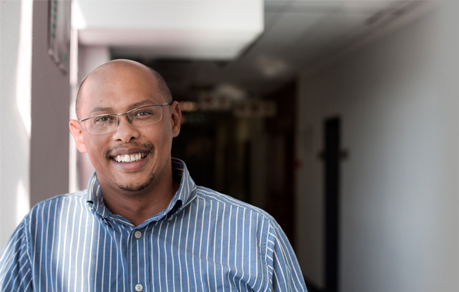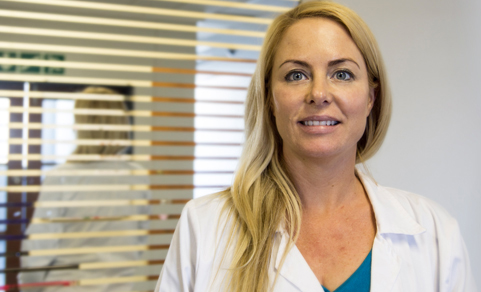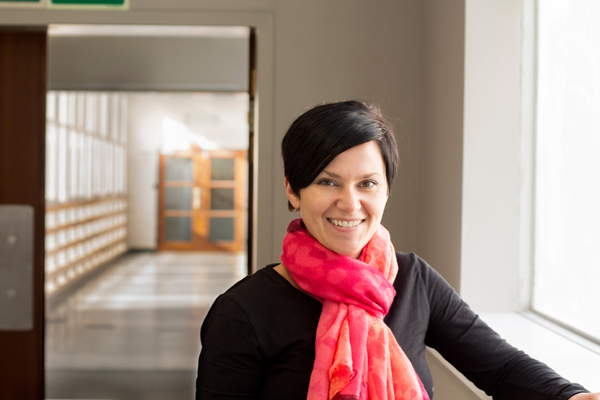Professor Novel N Chegou heads the TB diagnostic biomarker research laboratory within the Stellenbosch University Immunology Research Group. He was trained as a Medical Laboratory Scientist at the Faculty of Health Sciences, University of Buea (Cameroon), prior to completing his postgraduate and postdoctoral studies in the field of Tuberculosis Immunology.
Prof Chegou's research work mainly focuses on the discovery of biomarkers for the diagnosis of tuberculosis and monitoring of the response to treatment. He is particularly interested in the development of point-of-care diagnostics and conducts research in both adults and children and in both pulmonary and extrapulmonary TB. Other work that is ongoing in the Chegoulab makes use of animal models to understand the effects of altered composition of the gut microbiota on TB disease development and how polysaccharides that are produced by selected commensal bacteria influence both the susceptibility to TB and the response to TB treatment.
Prof Chegou is a South African National Research Foundation (NRF) B-rated scientist, a winner of the UK Royal Society's Africa Prize (2022), an SAMRC Silver Medalist, and an EDCTP Senior Fellow. He holds an EDCTP-Senior Fellowship (grant no: TMA2018SF-2470) for a research project entitled "Evaluation of new biomarker-based approaches for improving the diagnosis of childhood tuberculous meningitis (TBMBIOMARKERS)" alongside other research grants. To view Prof Chegou's NCBI publications list click here.

Prof André Loxton
Head of B-cell Lab (#LoxtonLab)
Tel: +27 21 938 9953
gl2@sun.ac.za



Prof André G Loxton is a specialist scientist of the SA Medical Research Council (SAMRC) and member of SU-IRG. He completed his studies at Stellenbosch University and his PhD focused on regulatory T-cells during HIV-TB co-infection.
Prof Loxton currently leads the B-cell laboratory and his research continues around the different cell phenotypes, specifically regulatory (killer) B-cells (currently evaluating new roles for these cells) present during latent and active Tuberculosis and HIV disease and the discovery of associated biomarkers of infection, disease progression and treatment response.
He is actively involved in TB vaccine studies and leads the vaccine end-point characterization. He is experienced in a wide range of research-related activities, from operational issues of cohort recruitment and follow-up to advanced immunological and molecular biology laboratory techniques, which is ideally suited for research in Tuberculosis in a high endemic area.

Prof Nelita du Plessis
Head of Innate Immunity Lab
Tel: +27 21 938 9953
nelita@sun.ac.za




Key areas of expertise: Innate immunity, Regulatory myeloid cells, Tuberculosis host-directed therapies, Site-of-disease responses, 3D granuloma models, Helminth infections
Prof Nelita du Plessis is an infectious disease immunologist at the Stellenbosch University Immunology Research Group, heading the Innate Immunity lab. She completed her undergraduate studies and obtained Hons B.Sc (Molecular Genetics) and M.Sc (Human Genetics) degrees from Stellenbosch University. She completed her PhD in Biomedical Sciences in 2012.
Prof du Plessis has a keen interest in innate immunity in the context of Tuberculosis (TB) and helminth infections, particularly the impact of regulatory myeloid cells (RMC), such as myeloid-derived suppressor cells (MDSC), on host immunity. Her research focuses on developing myeloid-targeted host-directed therapies for TB; host immune responses at the lung infection site of people with-/without- TB exposure or disease; and optimization of biomimetic technologies for 3D TB infection models. Her work integrates cellular, transcriptomic and epigenetic technologies to unravel mechanisms of immune susceptibility and protection in TB.
Prof du Plessis is an NRF rated scientist and an ECTP Career Development Fellow (CDF-1546) for investigating the functional effect of small-molecule targets on MDSC function and phenotype in TB. She is co-site PI on the National Institute of Allergy and Infectious Diseases (NIAID) funded contract “Immune Mechanism of Protection Against Mycobacterium Tuberculosis Center (IMPAc-TB) (Cascade study- K. Urdahl)" and the NIH funded studies “Lung Resident, MR1-Restricted T-Cells: Association with Differential Outcomes Following Exposure to M. tuberculosis - D. Lewinsohn" and “T cell recognition of the MR1 presented microbial metabolome - E. Adams".
Selected publications: https://www.ncbi.nlm.nih.gov/myncbi/10gIfdAubLWkO/bibliography/public/

Dr Léanie Kleynhans
Head of TB and Diabetes Lab
Tel: +27 21 938 9953
leaniek@sun.ac.za
Dr Léanie Kleynhans is a senior scientist with the Stellenbosch University Immunology Research Group. She obtained both her undergraduate BSc and Hons BSc (Medical Biochemistry) degrees from the University of Stellenbosch before completing her PhD (upgraded from MSc) in Molecular Biology in 2012. Her PhD focussed on the effects of the three-month injectable contraceptive, Medroxyprogesterone acetate (also known as Depo Provera), on host immune responses to Mtb in humans and in a mouse model.
Her current research interest is the interplay between the immune and endocrine system as well as the immunomodulatory properties of endogenous hormones on the immune system in the context of TB. Léanie particularly focuses on the link between TB and type 2 diabetes and investigates whether the endocrine dysregulation during type 2 diabetes contributes to increased risk of TB. Dr Kleynhans is a co-investigator on an NIH RO1 grant under the US-South Africa collaborative framework entitled “Altered endocrine axis during type 2 diabetes and tuberculosis risk".
 Prof Katharina Ronacher
Prof Katharina Ronacher
katharina.ronacher@mater.uq.edu.au
Prof Katharina Ronacher joined SU-IRG in 2006 and spent over 11 years working on TB biomarkers under the guidance of Prof Gerhard Walzl. Her research focused on the link between TB and Type-2 diabetes (T2D) for which she was awarded a 5-year NIH RO1 grant in 2015 to investigate whether the endocrine dysregulation during T2D contributes to increased risk of TB. At the beginning of 2017, Prof Ronacher re-located to the Translational Research Institute, Mater Research Institute at the University of Queensland in Australia, where she now heads the Infection, Immunity and Metabolism Research Group. She continues to hold an extraordinary appointment at Stellenbosch University, a C2 rating from the NRF and active collaborations with Prof Walzl and Dr Leanie Kleynhans from SU-IRG.

